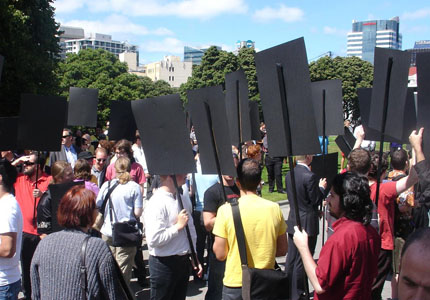NZ kills copyright amendment

New Zealand's controversial amendment to its Copyright Act, known as Section 92A, will be scrapped in its current form, NZ Commerce Minister Simon Power announced today.

Anti-copyright protesters in Wellington
(Credit: Rory Purcell-Hewitt/ZDNet.com.au)
The amendment was due to come into force on 27 March, but its introduction has now been suspended until it can be amended to address the areas which had been concerning industry and public.
"Allowing section 92A to come into force in its current format would not be appropriate given the level of uncertainty around its operation," Power said in a statement. The minister said industry discussions on the code had exposed problems with the legislation, passed by the previous government.
"These discussions have exposed some aspects of section 92A which require further consideration," Power said. "While the government remains intent on tackling this problem, the legislation itself needs to be re-examined and reworked to address concerns held by stakeholders and the government."
Yet the amendment was still necessary, Power said. "This legislation was put in place to combat unlawful file-sharing which facilitates copyright infringement on a large scale," he said. "This behaviour is very costly to New Zealand's creative industries and needs to be addressed."
The government would immediately begin a review to amend the section, according to Power.
The section requires internet service providers (ISPs) to have a policy to terminate the internet account of repeat copyright infringers in appropriate circumstances. There had been grave concerns, including protests both online and physical about how this would be implemented.
Prime Minister John Key had already delayed the amendment in the hopes that a voluntary code of practice might be worked out between ISPs and copyright holders which would accompany the amendment to create certainty on how industry players would act.
TelstraClear scuttled the talks by exiting them, saying it didn't believe an industry code would help. For the code to be accepted, it needed unanimous agreement from the parties.